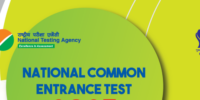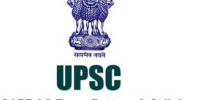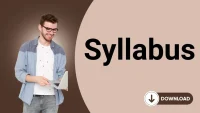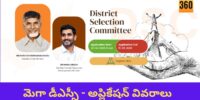AP Mega DSC Notification 2025 has been released and the Applicants have started preparing for upcoming Examination. There are 7487 School Assistant Posts were mentioned in the Recruitment Drive in Various Subjects Such as – Telugu, English, Tamil, Maths, Physical Science, Biology and other Subjects. Candidates must be aware of the Latest Syllabus pattern before starting to prepare for the CBT Exam.
In this Article, the AP Mega DSC Syllabus for All Major Subjects has been attached as a PDF.
AP DSC SA Exam Pattern for School Assistants (Non-Languages & Languages)
Duration of examination: 2 Hours 30 Minutes
| Part-I | General Knowledge and Current Affairs | 20 MCQs | 10 Marks |
| Part-II | Perspective in Education | 10 MCQs | 05 Marks |
| Part-III | Classroom Implications of Educational Psychology | 10 MCQs | 05 Marks |
| Part-IV | Content of the concerned subject | 80 MCQs | 40 Marks |
| Methodology of the concerned subject | 40 MCQs | 20 Marks | |
| TOTAL | 160 MCQs | 80 Marks | |
AP DSC SA Syllabus 2025
Part I: General Knowledge and Current Affairs
Part II: Perspective in Education
- History of Education
- Teacher Empowerment
- Educational Concerns in Contemporary India
- Acts / Rights
- National Curriculum Framework – 2005
- National Education Policy-2020
Part III: Classroom Implications of Educational Psychology
- Individual differences: Inter and intra individual differences, meaning, nature and theories of intelligence with special emphasis to multiple intelligence, IQ, assessment of intelligence, EQ, Creativity. Attitude, Aptitude, Interest, Habit and its Influence on Intelligence – Class room implementation.
- Learning: Theories and approaches of learning, learning curves, Factors, Phases, Dimensions of learning, Types of learning, Transfer of learning. Memory, Forgetting, Learning and assessment– Class room implementation.
- Personality: Nature, characteristics and theories of personality, factors of Personality, Assessment of Personality, Mental health, Adjustment, Stress – nature, Symptoms and management. Emotional intelligence, Management of emotions – Class room implementation.
Part IV: Content of the concerned subject
Class VI To Intermediate level syllabus
Part IV: Methodology of the concerned subject
AP DSC – Part IV Sylabus of Various Subjects
English – Literature Detailed Study
| LITERATURE | LEVEL OR AREA OF TESTING |
| Background of English Literature | Poetical Types, Stanza forms, School and Movements, Dramatic Types, The Essay, The Novel, The Short Story |
| Literary Terms | *Parallelism, Prologue, epilogue, setting, the character, metre, diction, imagery, prosody, point of view, epic, mock epic, choreography, narration, classic, chorus, comedy, tragedy, conflict, plot, criticism, discourse, empathy, sympathy, style, theatre, feminism, soliloquy, folklore, structure; *Figures of Speech – Simile, Metaphor, Apostrophe, Personification, Metonymy, Synecdoche, irony and alliteration; *Rhyme Scheme |
| Poetry (Detailed Study) | 1. Where the Mind Is without Fear (Rabindranath Tagore) 2. The cloud (P.B.Shelly) 3. The Nation’s Strength (R.W.Emerson) 4. Palanquin Bearers (Sarojini Naidu) 5. The Road Not Taken (Robert Frost) 6. A Slumber did my spirit seal (William Wordsworth) 7. Telephone Conversation (Wole Soyinka) 8. The Night of the Scorpion (Nissim Ezekiel) |
| Prose / Essay (Detailed Study) | 1. Of studies (Francis Bacon) 2. Self-reliance (R.W.Emerson) 3. On Shaking Hands (A.G.Gardiner) 4. What Makes a Nation (C. Rajagopalachari) |
| Novels (Detailed Study) | 1. Animal Farm (George Orwell) 2. Swami and Friends (R.K.Narayan) |
| Drama (Detailed Study) | 1. Twelfth Night (William Shakespeare) 2.The Importance of Being Earnest (Oscar Wilde) |
| Short Story (Detailed Study) | 1. The Bet (Anton Chekhov) 2. Engine Trouble (R. K. Narayan) 3. After Twenty Years (O’ Henry) 4. The Thief (Ruskin Bond) |
(Class VI to Intermediate level syllabus)
| VOCABULARY | LEVEL OF TESTING |
| Synonyms | Identification of Shades of Meaning |
| Antonyms | Identifying Antonyms in a Context |
| Homophones | Identification & Usage |
| Homonyms | Identification & Usage |
| Hypernyms & Hyponyms | Identification & Usage |
| Spelling | Spelling |
| One-word Substitutes | Referring to Persons / Professions, Places, Collections |
| Phrasal Verbs | Identification of Meaning and usage |
| Idiomatic Expressions | Identification, Usage |
| Proverbs | Proverbs |
| Word Formation | Suffixes, Prefixes and other forms |
| Short Forms – Full Forms | Common Short Forms – Full Forms |
| Abbreviations – Full Forms | Common Abbreviations – Full Forms |
| Word Collocations | Word Collocations |
| Foreign Phrases Used in English | Standard and common Foreign Phrases Used in English |
| GRAMMAR | LEVEL OF TESTING |
| Helping Verbs | Form, Function & Contractions |
| Modal Auxiliaries | Form, Function & Contractions |
| Ordinary Verbs | Form, Function & Contractions |
| Articles | Use of Articles Including Omissions |
| Prepositions | Simple, Compound Prepositions Including Prepositions following Certain Words and Prepositional Phrases |
| Clauses | Main Clauses, sub-ordinate Clauses, Adjectival Clauses, Noun Clauses, Adverbial Clauses, Relative Clauses, Finite and Non-finite Clauses |
| Sentence Structures | Sentence Structures |
| Degrees of Comparison | Form, Function, Construction, Transformation |
| Language Functions | Language Functions with social norms (formal and informal) |
| Question Tags | Imperatives and Statements with semi negatives and indefinites subjects |
| Types of Sentences | Types of Sentences |
| Sentence Improvement | Sentence Improvement |
| Direct Speech & Indirect Speech | Statements, Questions, Imperatives and Exclamatory Sentences |
| Active Voice & Passive Voice | Active Voice & Passive Voice |
| Tenses | Use of tenses and framing including ‘IF’ conditionals Type 1, 2 &3 |
| Agreement between subject & Verb | Agreement between subject & Verb |
| Word Order | Word Order In a phrase or a sentence |
| Parts of Speech | Nouns, Pronouns, Adjectives, Adverbs, Conjunctions, Interjections – Types and functions |
| Linkers | Linkers |
| Transformation of Sentences | Simple. Compound and Complex Sentences |
| Common Errors | Based on all Vocabulary and Grammar Topics |
| MECHANICS OF WRITING | LEVEL OF TESTING |
| Punctuation and Capitalization | Use of capital letters, comma, full stop, question mark, exclamation mark and inverted commas |
| COMPOSITION | LEVEL OF TESTING |
| Writing of Discourses | Letter Writing, News Report, Diary Entry, Conversation, Description, Diary Entry, Biographical Sketch, Story, Script for a speech |
| DICTIONARY SKILLS | LEVEL OF TESTING |
| DICTIONARY SKILLS | DICTIONARY SKILLS |
| PRONUNCIATION | LEVEL OF TESTING |
| Phonetics, Stress & Intonation | Phonetic Transcription and stress marking including intonation in context |
| READING COMPREHENSION | LEVEL OF TESTING |
| Prose | Prose (GENERAL) |
Methodology (20 Marks)
- Aspects of language (English Language History, Nature, Importance, Principles of English as Second language and problems of Teaching / learning English)
- Objectives of Teaching English
- Development of language Skills (Listening, Speaking, Reading and Writing; Communicative Skills and Imparting values through Communication
- Approaches, Methods and Techniques of Teaching English (Introduction, Definition, Types of Approaches, Methods and Techniques of Teaching including Remedial Teaching)
- Teaching of Structures, Vocabulary and Grammar
- Teaching Learning Materials in English
- Lesson Planning
- Curriculum and Textbooks – Importance and need
- Evaluation in English Language
- Pronunciation, Phonetics and Phonetic Transcription
Telugu – Content (40 Marks)
1) తెలుగు సాహిత్య చరిత్ర:
• కవులు, కాలం, రచనా విశేషాలు, బిరుదులు, ఇతివృత్తం, పాత్రలు, విశేషాంశాలు, వివిధ ప్రక్రియలు
• ఆధునిక కవిత్వ ధోరణులు, లక్షణాలు
2) తెలుగు భాషా చరిత్ర:
•మాండలిక భాష – స్వభావం, ఉత్పత్తి, భేదాలు
• గ్రాంథిక భాష, వ్యావహారిక భాష – ఆధునిక ప్రామాణిక భాష
• అర్థ విపరిణామం
*ధ్వని – ధ్వన్యుత్పత్తి స్థానాలు
3) సాహిత్య విమర్శ:
• కావ్యం – నిర్వచనం – కావ్య ప్రయోజనం – కవిత్వ హేతువులు – శైలి – సంస్కృత, పాశ్చాత్య లాక్షణికుల సిద్ధాంతాలు
4) బాల వ్యాకరణం:
సంజ్ఞ, సంధి, తత్సమ, అచ్చిక, సమాస, పరిచ్చేదములు.
6వ తరగతి నుండి ఇంటర్మీడియట్ వరకు గల ఆంధ్రప్రదేశ్ ప్రభుత్వ పాఠ్యపుస్తకాలు
1) తెలుగు వాచకాలలోని అంశాలు: (ఉపవాచకాలతో సహా) కవికాలాదులు, నేపథ్యాలు, ఉద్దేశాలు, మూల గ్రంథాలు, విశేషాంశాలు, ఇతివృత్తాలు, పాఠ్యాంశ విషయాలు మొ॥వి; విద్యాప్రమాణాలు.
2) పదజాలం: అర్థాలు, పర్యాయపదాలు, నానార్థాలు, వ్యుత్పత్త్యర్థాలు, ప్రకృతి – వికృతులు, జాతీయాలు, సామెతలు మొ॥వి.
3) భాషాంశాలు: సంధులు, సమాసాలు, ఛందస్సు, అలంకారాలు, పారిభాషికపదాలు క్రియలు, వాక్యాలు మొ||వి.
4) ఛందస్సు: (వృత్తాలు, జాతులు, ఉపజాతులు) యతులు, ప్రాసల రకాలు – ఛందోదర్పణం
V. తెలుగు బోధన పద్ధతులు: 20 మార్కులు
బి.ఎడ్ తెలుగు బోధన పద్ధతులు. (తెలుగు అకాడమీ ప్రచురణ)
1. భాష – వివిధ భావనలు
2. భాషానైపుణ్యాలు
3. ప్రణాళిక రచన – పాఠ్యగ్రంథాలు
4. విద్యా సాంకేతిక శాస్త్రం – సహపాఠ్య కార్యక్రమాలు
5. సాహిత్య ప్రక్రియలు – బోధన పద్ధతులు
6. మూల్యాంకనం – పరీక్షలు









